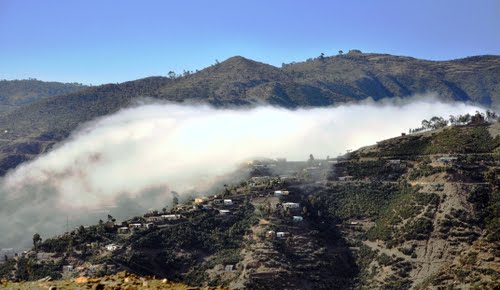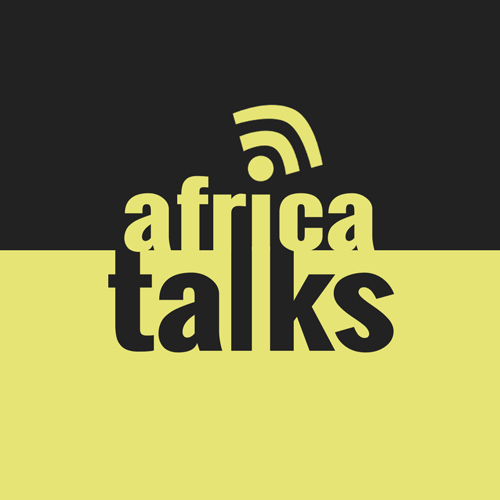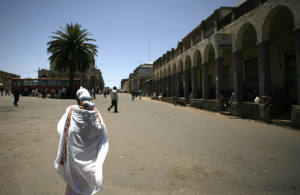Eritrea: The Fog Over the Red Sea
Eritrea's strict media control

Eritrea: The Fog Over the Red Sea
Eritrea's strict media control
This article was written by Armin Rosen, the Atlantic‘s International Channel producer and was originally published here.
Eritrean information minister Ali Abdu, who is rumored to have defected this past week, helped build one of the world’s strictest systems of media control.
Eritrea sits on some of the most important real estate in Africa, occupying a thin sliver of coastline at the mouth of the Red Sea. The country straddles one side of a globally significant shipping lane, and the actions of whoever’s ruling in Asmara affects the stability of every neighboring country, from already troublesome places like Sudan, Ethiopia and Somalia to Yemen and Saudi Arabia, which lie just across the sea. Yet Eritrea itself is one of the most opaque places on earth. Under the 21-year rule of Isaias Afewerki, the country has aided al Qaeda-affiliated militants in Somalia, warred against Ethiopia, and precipitated a refugee crisis that has percolated throughout the Horn of Africa and the greater Middle East, cloaked in a fog that even other governments have a difficult time penetrating. Ali Abdu, the country’s all-powerful information minister, is part of the reason why. In an ironic development, it is now unclear whether Abdu is still working with the government, or even if he is still in Eritrea. Thanks to the strict information controls Abdu helped erect during his decade-long tenure as information minister, his movements over the past month have been shrouded in mystery, his possible defection from Afewerki’s government shielded from public view by the very system he helped create.
Evidence of Abdu’s defection mostly lies in a French-language report by freelance journalist Leonard Vincent, who supposedly based his findings on both defectors and sources in Asmara. According to Eritrean diaspora sources, Abdu, who left Eritrea for Europe in November, had been traveling with state TV producer Daniel Kiflom, who is also rumored to have defected from Afewerki’s government (Kiflom did not comment when reached by email). In late November, when an Eritrean opposition website claimed that Abdu had defected during his trip abroad, media reports quickly circulated that the minister had already returned to Asmara, and that reports of his departure were fabrications meant to destabilize Eritrea. Vincent’s article asserts otherwise: that no one has seen Abdu in the capital for several weeks, or even spoken to him. Abdu already has family living abroad: his wife has been living in Canada for several years, and he has a brother who lives in California, a cofounder of an English-language Eritrean news site. And he hasn’t been spotted in public for several weeks.
“ The rumors are symptomatic of the regime’s draconian grip on information.”
Mohammed Keita of the Committee to Protect Journalists is not sure if the reports of Abdu’s defection are true. But Keita, who covers Eritrea for CPJ and who has communicated with Abdu to voice his concerns on media freedom issues on several occasions, wouldn’t dismiss them either. “It’s definitely the case that he hasn’t been seen in public,” Keita told me. “And even when we were trying to get in touch with him three weeks ago [after the earlier reports of his defection], none of his numbers worked, or he didn’t respond.” Something is up, but that may or may not mean that Abdu is on his way to Canada or the United States, as some sources in the diaspora have already indicated. When reached for comment, an official at Eritrea’s permanent mission to the U.N. said that Abdu is in the capital, and was still information minister. For Keita, this week’s reports at least “point to an unanswered question about [Abdu’s] unusual disappearance from public view.”
And they point to a larger, related issue as well. Abdu played a central role in one of the most oppressive governments on earth. The opacity that now surrounds his whereabouts is a symptom of more general problems in Eritrea, issues that have made life virtually impossible for much of the population — indeed, over a quarter-million Eritreans are living as refugees in surrounding countries, despite the absence of war or (for the most part) famine conditions within Eritrea itself. “The rumors are symptomatic of the regime’s draconian grip on information,” says Keita. And that, in turn, is symptomatic of Afewerki’s draconian grip on nearly everything else.
Some countries in the Horn of Africa are worrying because of the potential for instability — after all, Somalia is just emerging from 20 years of anarchy. Eritrea is the exact opposite. According to Salem Solomon, an Eritrean-American journalist and television producer who worked for Abdu’s information ministry before moving to the United States, the country is run on a highly “systematic” basis, especially for its young adults. “If you are a young person working in Eritrea, you’re either doing [national] service or you’re a student. That’s how it works,” she said, describing a system where most of the country is conscripted into either the military or civil service at the end of their high school years. “You don’t look for a job. It’s all laid out for you. It’s not in your hands” (as for the private sector, Eritrea is one of the hardest places in the world to do business, according to the World Bank).
Solomon said that thanks to recent reforms, some Eritreans spend their senior years of high school in military camps, preparing for several subsequent years of national service. “Your understanding of politics and what it means to be Eritrean starts when you’re young and it plays into your career,” she says. “Before you graduate high school, you’re already in the military. Whether you’re a doctor or a journalist or whatever you become later, you’ve already had political education and military training in your system to understand how things work.” During military service, Solomon says there is “political education every day. It’s just part of the routine.”
The strict control over the lives and career trajectory of the country’s youth is an outgrowth of Afewerki’s aggressive stance towards Ethiopia, Eritrea’s far more populous eastern neighbor. Eritrea gained its independence from Ethiopia in 1992. Even though Afewerki fought alongside the late Ethiopian prime minister Meles Zenawi in the struggle against Ethiopia’s communist regime, the two became bitter opponents, waging a brutal war over a disputed border–and likely over more opaque and personal matters — in the late 1990s. The enmity between the two countries continues, even after Zenawi’s death in August.
Solomon served in the military, and then was able to earn a journalism degree from Asmara University, on the government’s dime — she says her education was repaid in the form of her later work for the English-language desk at Eri-TV, the state television station. “It’s all about growth and achievement, you know,” she said of Eri-TV’s programming. “Only good stuff.” The station focused much of its energies on covering “things a government should do,” like development projects or meetings.
Bealfan Tesfay, a U.S.-based journalist who worked in Eritrean state media as late as 2010, has a similar view of the ministry’s narrow editorial priorities. “It was not exactly journalism,” he told me of his work as an editor and television producer. “It was propaganda… In the west, we think of the press as the watchdog of the society. In Eritrea, it’s used for the purposes of upholding the interests of the state of Eritrea.” He wrote about national holidays and celebrations, and churned out stories with a clear anti-western and anti-American tilt — Afewerki is still suspicious of the United States for what he views as its refusal to pressure Ethiopia, a close American ally, into accepting international arbitration on the countries’ border dispute. Story topics would be passed down from on high, and he would sometimes need official approval to even conduct interviews. Some stories were completely off limits, including one that would turn out to be arguably the largest event in the entire world. “Back in February of 2010 there was a total blackout of the Arab Spring,” he said. “I was working in the office and was instructed not to print anything about the Arab Spring. As far as the government media in our country was concerned, there was no Arab Spring. The events in Egypt weren’t reported.”
According to CPJ, Eritrea is has the strictest media censorship of any country on earth. Journalists areimprisoned and even killed, and Abdu and Afewerki have ensured that there is no independent press, period. “[Abdu] was the architect of the government’s control and direction of the media,” says Keita. “He directs the media on what it should report, and all the censors report to him. He dictates and directs the regime’s propaganda infrastructure…there’s no media that can operate in Eritrea without Ali Abdu’s approval or direction.”
“ Journalism, at least in the sense that much of the world understands it, is effectively illegal in Eritrea.”
A decree issued just a week after the terrorist attacks of September 11, 2001 — a moment when the international community had other, more seemingly-pressing concerns than governance and press freedom in the Horn of Africa — outlawed any journalism conducted by entities other than the country’s government. According to Keita, that directive, which suspended most constitutional rights and basically made journalism as much of the world understands it illegal in Eritrea, came from Abdu’s office, just three months before scheduled national elections. “[Government officials] essentially went on national radio to order all private newspapers to suspend operations indefinitely. And in the hours and days following that order, they just arrested all the editors of these newspapers, and they rounded up all the reformists who had been calling for the implementation of the constitution and the holding of elections,” says Keita.
here are no shortage of blogs and independent news sources maintained by Eritreans in the diaspora. But the only news available inside the country — and virtually the only news that’s being reported from inside Eritrea itself — is gathered under Abdu’s auspices. For those who are interested in what’s going inside of the Eritrean government, things are no clearer for those in the country as they are for those watching from the outside. “I am as informed as I am now as I would be if I was living there” in terms of the country’s politics, Solomon says.
Tesfay remembers Abdu — the man responsible for maintaining the thick fog of secrecy surrounding the country — as a secretive and arbitrary individual who would promote, demote or fire his subordinates with little explanation. His mandate to enforce an absolute control of information seemed to inform his managerial style: “He was very much engaged or concerned with office politics,” says Tesfay. “He ran the ministry as if it was his backyard…he controlled the office through everybody informing on one another.” Tesfay said Abdu would reassign career journalists to clerical jobs for no apparent reason, including one of the country’s most accomplished news photographers. His subordinates lived in fear of him. “He was an extremely cruel person. Sometimes you would think he would have some sadist tendencies or something like that.”
Yet Tesfay says that conscious fear wasn’t exactly what motivated him and his colleagues. “People shut up and did their work,” he recalls. “They didn’t even care about it. They just did it.” He says life in Eritrea is the same way: faced with the possibility of being fired or even imprisoned for taking an interest in the country’s political affairs, most people’s first instinct is simply to keep out of trouble,. They internalized the constant self-censorship needed in order to survive. “No one is politically aware even in Eritrea. They couldn’t care less about what goes on in their country. They hate it, they don’t like the system, but they just go about their lives,” says Tesfay. “No one talks about politics, no one cares about politics. No one wants to go to prison.”
An unintended consequence of this is that even within the information ministry, few people seem to be convinced of the government’s propaganda (and a fascinating Wikileaks cable suggests that Abdu might not have been that convinced either). Solomon, who left the country legally (and did not defect), says that one of her former bosses defected while she was still working for the ministry. “Everybody I knew in my generation…they’re all out,” Solomon says.
Tesfay says that many of his old colleagues and acquaintances have defected as well. After all, leaving Eritrea is one of the only forms of political dissent available. “If you have a problem with the way the country is being run, you leave the country,” he says. “That’s the only option you have in that sense.
And even leaving is extremely difficult: the government often won’t grant exit visas to its citizens; when it does, it can charge them up to $10,000. Fleeing Eritrea means walking to the border and wandering into a refugee camp in Ethiopia or Sudan, a journey that not everyone survives. Even so, nearly 250,000 Eritreans are now living in neighboring countries, and another 8,500 live in Israel, which is over 1100 miles away. Many of the people who have fled are of military age, according to a UN Humanitarian News Agency reportthat estimated that between 1,200 and 1,500 people were fleeing the country each month. Living in a place as isolated and restrictive as Eritrea, along with the prospect of spending the period between your senior year of high school and your mid-to-late twenties in the military or national service is, for tens of thousands of people, less attractive than the dangers and indignities of fleeing the country. The U.N. expects it to continue that way: in their country assessments for Ethiopia and Sudan, UN High Commission for Refugees is budgeting for an additional 25,000 Eritrean refugees in 2013.
News of Abdu’s defection barely rises above a rumor at this point. Yet the incident offers a glimpse of some of the challenges that Eritrea’s opacity creates. “The fact that someone’s not in a meeting doesn’t say anything,” says Saleh Gadi, editor of the diaspora news site Awate, of Abdu’s absence. “It’s a situation where people have to guess why somebody was not in a meeting. It just shows how closed the government is.” For a country with as crucial a strategic position as Eritrea, the fog has some very tangible dangers attached to it. It is a problem when a country with a military with over 200,000 personnel according to the International Institute for Strategic Studies, and a history of bellicosity towards its neighbors, is so difficult to read.
David Shinn, who served as the U.S. ambassador to Ethiopia during Bill Clinton’s second term, and during the late 90s war between Ethiopia and Eritrea, says that American diplomacy in the region was often hampered by both sides’ steadfast unwillingness to cede any ground to the other, and by the secretive nature of the decision-making process within each government. “Neither Isaias nor Meles nor the people around him thought that it was accurate to see balance in the situation because they thought they were 100% right and the other guy was 100% wrong, and therefore how could the U.S. possibly see any rightness in the position of the other country?” say Shinn. “It cut both ways, and it made life difficult for me, and for my colleague in Asmara.” The U.S. was able to repair its relationship with Ethiopia in the years after the flare-up. The same was not true of Eritrea, whose government only became more unpredictable, disruptive and isolated in the ensuing decade.
In the late 2000s, Afewerki provided arms to Al Shabaab, an Al Qaeda affiliate fighting the Ethiopian military in Somalia — a decision that resulted in U.N. sanctions that are still in place. Although Shinn notes that official anti-Ethiopian activity has dramatically decreased since the onset of sanctions and the death of Meles Zeanwi, two major Ethiopian insurgent groups, the Omoro Liberation Front and the Ogaden National Liberation Front, were allowed to maintain offices in Asmara in the years after the war. Afewerki’s hostilities have hardly been limited to Ethiopia, and he has initiated acrimonious border disputes with both Yemen and Djibouti. “Over the years they’ve managed at one time or another to irritate all their neighbors,” says Shinn. And because of the U.S.’s perceived favoritism towards Ethiopia, Afewerki has ensured that relations between his country and the U.S. have remained chilly — there’s no U.S. ambassador in Asmara anymore, and Shinn says that high-level contacts are “non-existent.”
It’s possible that even one of the people most responsible for building Eritrea’s system of opacity and total control — a situation that has raised the temperature of an already-unstable and strategically-vital region — has decided he’s had enough. And he’s hardly alone. Over the past year, everyone from high-ranking air force pilots to the flag-bearer at the London Olympics to nearly the entire national soccer team has defected. The defections might suggest that Afewerki’s control is beginning to slip, or that even people close to his inner circle have lost faith in the system he’s built in the 21 years since Eritrea gained its independence. But as Solomon notes, even something as important as the possible disappearance of someone of Abdu’s stature can have the misleading effect of suggesting that the defection crisis is a recent development, or that things are significantly different now than they were in previous years. But, as the hundreds of thousands of young Eritreans refugees living throughout the Horn of Africa and the Middle East attest, nothing could be further from the truth.
“Ali Abdu’s one person,” she says. “It doesn’t compare to the border, if you see the number of people in Ethiopia and Sudan, in refugee camps all along the borders of the country. This is a significant issue. So if you want to look at that, you can start speculating and saying the government has been weakening for a very long time. But it only grabs your attention or my attention, and only becomes news, when somebody big runs away.”











